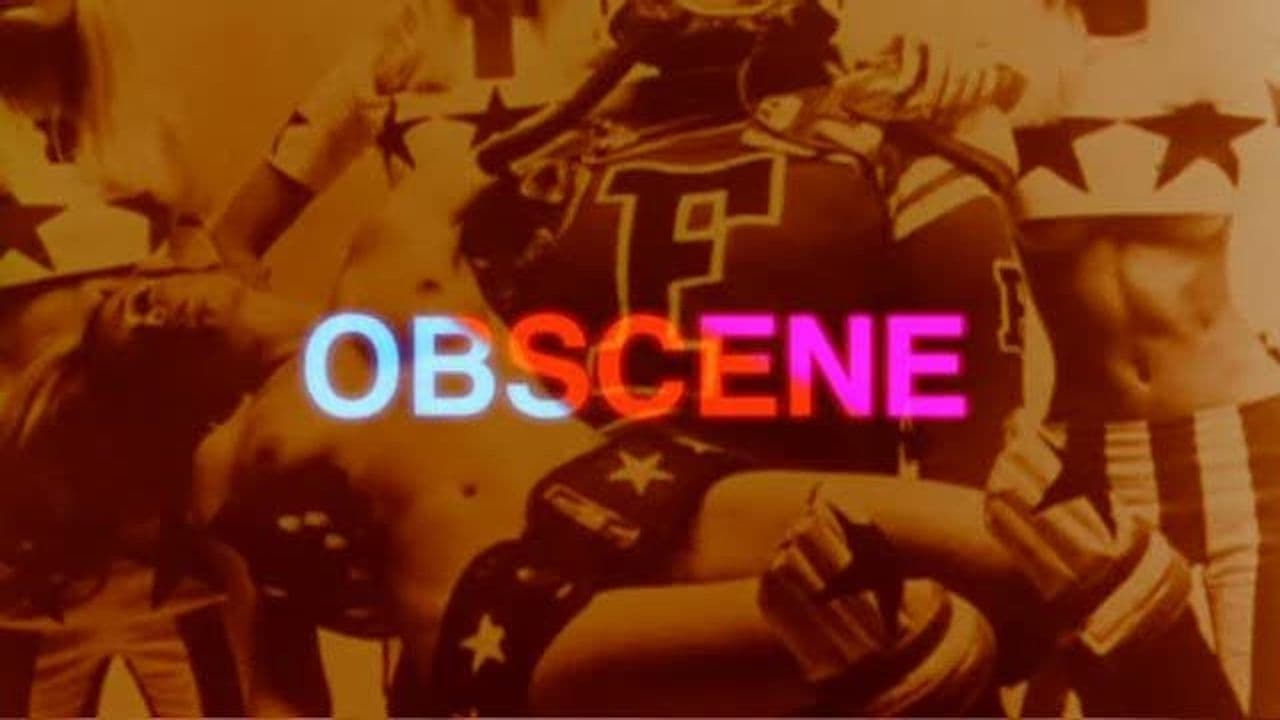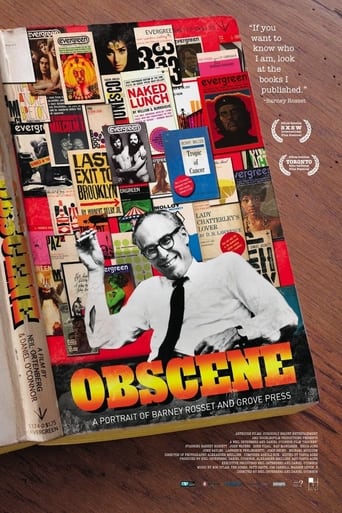

I like movies that are aware of what they are selling... without [any] greater aspirations than to make people laugh and that's it.
... View Moreit is the rare 'crazy' movie that actually has something to say.
... View MoreA lot of perfectly good film show their cards early, establish a unique premise and let the audience explore a topic at a leisurely pace, without much in terms of surprise. this film is not one of those films.
... View MoreThe acting is good, and the firecracker script has some excellent ideas.
... View MoreThis documentary gives a fair picture of the life of the courageous editor Barney Rosset, the founder of Grove Press, which published such 'pornographic' authors as the Marquis de Sade, Henry Miller, William S. Burroughs or D.H. Lawrence (Lady Chatterley's Lover). From the beginning, his publishing house was a heavy thorn in the eye of the Moral 'Majority' (power, not numbers). One sees in this picture even a disgusted and angry US President waving before a TV camera, 'obscene' photos distributed by Rosset's press. As always, the Moral 'Majority' was and is heavily obsessed by sex, but not by killing in wars. But did porn kill until now one human being on earth? What and where is the 'real' pornography?Barney Rosset was physically threatened and ultimately, his headquarters were bombed (!) by apparently members of a secret service. He was a true pioneer of free speech, also in sexual matters. Of course, he was interested in sex. Who is not, in a positive or negative sense? In any case, he didn't thrive on the profoundly vulgar standards of the actual adult industry, a multi-billion dollar business built on hundreds of years of sexual repression. As Christopher Hitchens states in his formidable book 'God is not great': 'god gave man a sexual impulse, only for religion to suppress it.'This documentary is a must see for all people interested in free speech, in the policies of the Moral 'Majority' and in the real nature of mankind.
... View MoreSan Francisco's Roxie Theater had a week's run of "Obscene" at the beginning of September 2008. I sat in an audience of four during the Sunday matinée. This seemed a sad turnout for a major documentary on the eccentric, revolutionary, beyond-category Barney Rosset (Barnet Rosset, Jr.), a publisher and film champion who reshaped American letters during his Grove Press years. Without him certain of your important freedoms would only be theories on paper.How much opposition did Grove Press and its EVERGREEN REVIEW magazine present to the Establishment? "Obscene" shows CBS reporting the 1975 findings of a U.S. commission which investigated domestic espionage by the Central Intelligence Agency. The investigators found that the CIA had exceeded its charter and the law in its domestic surveillance. The number three target for its illegal eavesdropping was Rosset's Grove Press.Have you seen "The Motorcycle Diaries" (2004)? Rosset published only one chapter of Che Guevara's memoirs in THE EVERGREEN REVIEW and his office got bombed the next night. "Obscene" tells us that Doubleday, already the publisher of Malcolm X (El-Hajj Malik El-Shabazz), feared to abrade public opinion by printing the autobiography that the Muslim leader had told to Alex Haley. Grove Press issued the book in 1965, just after Malcolm's murder. THE NEW YORK TIMES declined to review it. Contemplate those events. Measure the distance we have traveled as a people. You may thank Barney Rosset for helping us along. He's still alive. He can hear you.A compulsive defender of your civil liberties, Rosset published D. H. Lawrence's LADY CHATTERLEY'S LOVER in 1959. (French motion picture: 1955; British movie: 1981). He followed with Henry Miller's TROPIC OF CANCER and William Burroughs' THE NAKED LUNCH (film adaptation by David Cronenberg in 1991). He could have gone to prison each time, as Dwight Eisenhower's gloating postmaster general reminds us in "Obscene".Imagine those thrilling days of yesteryear when Ike chaired the military-industrial complex. The U.S. and U.S.S.R. poisoned the atmosphere with nuclear testing. A maze of federal, state, and local law prevented you from reading about Connie Chatterley or from ever seeing some of America's most experimental writing. Brusque men arrested and prosecuted and jailed anyone who imported or published or sold such works. Today I can find a working plastic replica of Jana Cova's vagina in an tourist store. I can watch a "Sex and the City" episode with Charlotte ogling a penis-shaped vibrator. In the 1950's Hugh Hefner would have been locked up for menacing the republic had he shown pubic hair in PLAYBOY. Barney Rosset changed that atmosphere of hypocrisy,repression, and an outward conformity to rigidly limited ideals. He didn't labor alone, but he did act pivotally. Consider the enlightened Great Society of Lyndon Johnson. While we warred on poverty and escalated troops in Vietnam, Ralph Ginzberg got a stay in the slammer for mailing ads for EROS from the township of Middlesex, New Jersey. That postmark decisively convinced the Supreme Court of 1966 that he was not serious in intent. Edward Mishkin also did time for offending New York State with sadomasochistic imagery believed by the Court to lack redeeming social significance. Justice William O. Douglas protested in a dissenting opinion that we cannot determine what significance such images may have for an individual. "Obscene" shows Congressman Gerald Ford demanding Douglas's impeachment for such views. Ford damns Douglas in part because he published an article in Rosset's EVERGREEN REVIEW. House Republican Leader Ford does not discuss the content of the article, merely the venue.Grove Press put out the standard editions of Bertolt Brecht, Marguerite Duras, Eugene Ionesco, Jean Genet, Pauline Reage, and the unexpurgated Marquis de Sade. Rosset brought new, major talent onto the American intellectual scene, including Samuel Beckett, Amiri Baraka/Leroi Jones, Dr. Eric Berne, Jakov Lind, Yukio Mishima, Harold Pinter, and Amos Tutuola. Hubert Selby, Jr.'s thorny but eloquent LAST EXIT TO BROOKLYN gets referenced in the "Obscene" end title song (the book hit celluloid with Jennifer Jason Leigh in 1989). Rosset did not make a fortune out of expanding our literary heritage, however. He impoverished himself in court case after court case, defending his--and your--First Amendment rights. You may associate his Grove years with hardcore pornography. That cash flow paid bills, particularly in the 1970's. Brecht and Beckett do not bring Nora Roberts-sized incomes into a publishing house. In the film Rosset confesses to Al Goldstein that he published material which turned him on as well as kept his press solvent. The film reveals that Barney's first love remained film. It copiously uses his home movies to illustrate his life. His maiden professional creative effort was the 1948 picture "Strange Victory", documenting violent racism in the U.S. and linking that vicious mindset to the Adolf Hitler we had supposedly defeated. The movie played one run in one theater. "Obscene" discusses Grove's release of the Swedish radical import "I Am Curious (Yellow)" (1967). However, we do not hear about Rosset's other plunges into movie distribution with the pre-Stonewall "The Queen" (1968) and Yukio Mishima's "The Rite of Love and Death" (1966).I met Barney in 1985 at the American Booksellers Association convention. Our bashful firebrand had a perpetual giggle in person. You get a touch of it in the film--but only a touch. That distinctive trait normally faded out during recorded interviews. I shook his hand at the Grove Press "booth" (some chairs around a lawn table under an umbrella). Shortly thereafter Ann Getty and Lord George Weidenfeld dumped him from Grove. The documentary functionally stops there. It does not discuss Rosset's Blue Moon Books, which roused libidos and raised hackles by publishing more erotica from familiar names such as P. N. Dedeaux, as well as books by Martin Pyx (cited in Amazon as "a cult author"), Daniel Vian, and others Barney brought newly on board. Writers you couldn't have read in this country fifty years ago.
... View MoreI attended the U.S. Premiere of "Obscene" at the 2008 SXSW Film Festival. But don't let the name fool you -- there is nothing obscene in or about this film. The only thing that's obscene is how government has tried to legislate morality and the courts have colluded over the past hundred years to block the publishing of literature by passing judgment on what is acceptable in America.This eye-opening documentary about legendary publisher Barney Rosset exposes the reality of how First Amendment rights have actually been withheld over the years. Considered the pioneer of anti-censorship laws, Rosset, as the owner of New York-based Grove Press and the Evergreen Review, was involved in lawsuit after lawsuit in an effort to introduce some of the world's greatest authors, poets, and filmmakers to America. In that he succeeded, yet his name may not be well known to the public. This film hopes to change that.Notables interviewed on screen include Ray Manzarek of The Doors, William S. Burroughs, John Waters, Gore Vidal, John Sayles, Erica Jong, Al Goldstein, Jim Carroll, Amiri Baraka, and Lenny Bruce -- a veritable Who's Who of artists and writers who've fought their own battles against censorship. "Obscene" is totally engaging and production values are top-notch.Books like Henry Miller's "Tropic of Cancer" and William S. Burroughs' "Naked Lunch," along with the film classic "I Am Curious: Yellow," would not be part of our culture if not for the work of Barney Rosset. More than anything, though, "Obscene" is a human interest story about the life of one man -- what he achieved and how he suffered in his later years. The film is both moving and heartbreaking, and long overdue. Certainly anyone whose career or personal life involves championing the First Amendment should see this movie.
... View MoreI had the opportunity to see this film at the SXSW film festival in Austin, TX. It is a wonderful tribute to a great and almost forgotten American, Barney Rosset, the publisher of Grove Press and the Evergreen Review. Despite its prominent place in the first amendment of the U.S. Constitution, the nature of free speech has long been contested within American society. Those of us under 40 often do not appreciate how much censorship used to exist in the U.S. until relatively recently, because this side of censorship has mostly disappeared. Free speech has not always been as free as it is today.Obscene, the story of Barney Rosset, is both a biographical picture and the story of the struggle to open up American society to new ideas and concepts. This is the story of transition from the repressed America of the 1950s to the more open society that would emerge from the 1960s/1970s and would continue to today. Some would say that opening up to that much obscenity has not been a good thing, but its really the cost of freedom.Barney Rosset, at great personal and financial cost, was one of those pioneers that spent his life tearing down rules that restricted the publication of books like Lady Chatterly's Lover, Naked Lunch, Tropic of Cancer and poems like Howl. He challenged the system to open up and confront topics that had once been taboo.I hope the film makers will make an edited - PG-13 version - available for classroom use. Perhaps it would be ironic to censor such a film, but it seems like a necessary sacrifice to get the core message out to young people who need to learn both how precious legacy free speech is - especially today when free speech faces different sort of challenges. The non-professional film makers have done a really first rate job including music and editing. The film is perhaps a little long at 97 minutes, but that is a minor flaw. I hope their film gets a wider distribution and that Barney Rosset is remembered for his important contributions to this country.
... View More